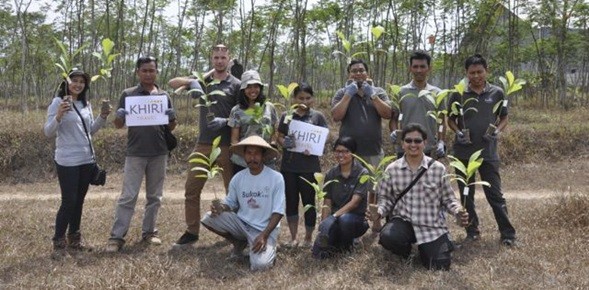Each year, Khiri plants mangrove trees at Samut Prakarn in the outskirts of Bangkok to compensate its emissions from the previous year.
BANGKOK – The Khiri Group has offset the 2014 carbon footprint of its family of companies for the 2014 year. It plans to offset its 2015 footprint by mid 2016.
Two tree planting campaigns took place in 2015 to offset 100 tons of carbon generated by Khiri Travel and Khiri Group in 2014. Some 80 mangrove trees were planted at Bang Kra Chao just outside Bangkok. In Indonesia, the company planted 1500 Albasia trees at Kecamatan Salam in Central Java.
The calculations on the extent of the group’s 2014 footprint were made by the Plant a Tree Today Foundation (PATT) in Thailand and Trees4Trees in Indonesia. They assessed the Khiri Group’s business flights in 2014 and derived a figure of 100 tons of CO2.
“With partners such as PATT and Trees4Trees, the offsetting process becomes measurable and doable with clear actions and outcomes,” said Khiri Group CEO Willem Niemeijer. “Our offsetting is consistent with our commitment to Travelife goals of being a company that stands for the planet as well as people and profit,” he said.
Niemeijer said Khiri Group’s 2015 footprint calculation would be available in the next few weeks for tree planting action by mid 2016.
In April 2014, the company also offset its 2013 emissions by planting 100 mangrove trees at the Bang Pu Nature Education Training Centre 40km south of Bangkok.

Khiri Thailand staff doing their annual activity of planting mangrove trees just south of Bangkok
“Around 50% of the world’s mangrove forests have been destroyed in the last 50 years,” said Mark Remijan, Partner and CFO of Khiri Group. “Khiri is active in this area because regeneration of mangroves boosts wildlife diversity as well as turning CO2 into oxygen.”
According to PATT, a UK registered charity, one mangrove tree can absorb approximately 800 kg of CO2 during its 40-year lifetime.This is approximately equivalent to, for example, what a single round-trip Hanoi to Phuket flight emits.
Each year, Khiri plants mangrove trees at Samut Prakarn in the outskirts of Bangkok to compensate its emissions from the previous year.
Mangrove forests play a vital role in acting as spawning and nursery areas for many species. Mangroves absorb more carbon dioxide per unit area than ocean phytoplankton, a critical factor in global climate stability.
Mangroves maintain water quality and clarity, filtering pollutants and trapping sediments originating from land. The inter-tidal trees around the world not only provide ecological functions essential to surrounding habitats, but are also an important resource for coastal communities engaging in industries such as fish farming and charcoal making.
Khiri Travel in Indonesia and Thailand offers trips to the tree planting areas for visitors interested in carbon offsetting and mangrove culture.
Photo caption: Khiri Indonesia planted Abasia trees at Kecamatan Salam, Central Java
Theodore is the Co-Founder and Managing Editor of TravelDailyNews Media Network; his responsibilities include business development and planning for TravelDailyNews long-term opportunities.












































































